
94% of researchers rate our articles as excellent or good
Learn more about the work of our research integrity team to safeguard the quality of each article we publish.
Find out more
ORIGINAL RESEARCH article
Front. Genet. , 03 December 2020
Sec. ELSI in Science and Genetics
Volume 11 - 2020 | https://doi.org/10.3389/fgene.2020.512582
Genetic testing aids patients in making important decisions in the prevention, treatment, or early detection of hereditary disorders. Low awareness of the importance of genetic testing contributes to the increase in the incidence of hereditary disorders. This study aims to explore the knowledge, awareness, and perception of genetic testing for hereditary disorders among local residents of the Klang Valley, Malaysia, and the potential variables that influence their understanding of genetic testing. A survey was conducted in different municipalities of the Klang Valley through self-administered questionnaire assessing the public's knowledge, awareness, and perception of genetic testing. Overall, the results revealed adequate knowledge and positive awareness of genetic testing, in which both were influenced by the respondent's educational level (P < 0.001), field of study (P < 0.001), and status of heard or unheard of genetic testing (P < 0.001). The perception of genetic testing was generally positive and influenced by the respondent's differences in age (P < 0.016), educational level (P < 0.001), field of study (P < 0.001), and status of heard or unheard of genetic testing (P < 0.001). Although positive responses were obtained, ~20.2% of the respondents had never heard of genetic testing. Of the respondents, 24.5% were unwilling to undergo genetic testing, with 25.1% believing that genetic testing tampers with nature and 18% believing that it opposes religion and their beliefs. Such attitude calls for the need to conduct programs to eliminate any misconception, as well as to educate the public to lessen any perceived misunderstanding of the concepts of genetic testing.
Genetic disorder is a health condition that is inherited by a person, usually caused by mutations in the deoxyribonucleic acid (DNA) or changes in the number or overall structure of chromosomes (Odelola et al., 2013). Several types of commonly known diseases have been determined to be related to hereditary gene mutations. In developed or developing countries including Malaysia, the major well-known non-communicable health concerns include hypertension, diabetes, and hypercholesterolemia (Lim et al., 2004; Hussein et al., 2015; Naing et al., 2016; Tee and Yap, 2017; Rifin et al., 2018). On the other hand, ~5–10% of cancers are known to contain hereditary components (Lu et al., 2014; Stanislaw et al., 2016). These include breast cancer (Miki et al., 1994; Edwards et al., 2003; McPherson, 2006) and colorectal cancer (Hampel, 2009; Jasperson et al., 2010; Stanislaw et al., 2016). Blood-related disorders, such as sickle cell disease, thalassemia, and hemophilia, are also hereditary diseases. These diseases are acquired by inheriting abnormal genes, such as hemoglobin C gene.
Previous studies reported a deficiency of knowledge of genetic testing among the public, including populations in developed and developing nations (Vermeulen et al., 2014; Agurs-Collins et al., 2015; Hann et al., 2017; Eum et al., 2018; Altaany et al., 2019). Meanwhile, similar studies targeting prenatal or neonatal genetic testing revealed that health education, facilities, and infrastructures should be further improved to enhance the adaptation of non-invasive genetic testing among the public (Kusyk et al., 2013; Abdo et al., 2018). Moreover, Colotto et al. (2015) reported a good level of awareness of and interest in genetic testing among medical students (Colotto et al., 2015). Despite the deficiency of knowledge of genetics among practitioners, gynecologists, and pediatricians reported in 2005 (Baars et al., 2005), a recent report proposed that physicians' confidence and interest in genetic testing can be augmented through additional health education (Haga et al., 2019).
A recent study reported the need of Malaysia to strengthen its role in the field of genetic test (Balasopoulou et al., 2017). Continuous efforts have been taken by researchers/stakeholders in Malaysia by introducing medical genetic services nearly a decade ago (Lee and Thong, 2013). Since then, genetic services have improved with the availability of genetic counseling, testing, and diagnosis. The recognition of Clinical Genetics as a subspecialty and increased funding for genetics services also contributed to the growth of genetic testing in Malaysia. In addition, a number of survey studies were conducted to examine the level of knowledge, perception, or awareness of patients or young Malaysians (Al-Naggar and Osman, 2013; Mustapa et al., 2019; Qian et al., 2019) or physicians (Amini et al., 2015) regarding genetic risk of inheritable disorders in Malaysia. Meanwhile, similar surveys were reported to conclude the views of undergraduates on genetic testing (Sim and Ting, 2018; Sulaiman and Zainuddin, 2018). However, the view of public toward genetic testing is still limited in Malaysia. In 2011, Wong et al. addressed public attitudes and perceptions on thalassemia (Wong et al., 2011). In 2013, Lee and Thong reported a limited public awareness in the same region (Lee and Thong, 2013). Therefore, an update on the public general knowledge, awareness, and perception toward genetic testing of hereditary disorders is necessary. To fulfill the research gap, this survey study aimed to examine the knowledge, awareness, and perception toward genetic testing of hereditary disorders in the public of Klang Valley, Malaysia.
This is a cross-sectional study conducted between September 2018 and November 2018, using convenient sampling targeting the local residents of the Klang Valley, including districts, such as Shah Alam, Subang Jaya, Ampang, Putrajaya, Kajang, Petaling, Cheras, and Kuala Lumpur. In accordance to the Department of Statistics of Malaysia, the total population of Klang Valley in 2018 was measured at 7.2 million. The sample size was calculated using Raosoft sample size calculator (Raosoft, Inc. 2004, http://www.raosoft.com/samplesize.html), providing a confidence level of 95%, with a margin of error of 5% (Albassam et al., 2018; Mason et al., 2018), which indicated the need to approach 384 responses in this study. To take into account of any redundancy, a total of 450 responses were collected. Responses were received from various districts of Klang Valley. Questionnaires were randomly distributed to the public in supermarkets (wet and dry markets), transport hubs (connecting train or bus stations), and areas with eateries, during both peak and off-peak hours. Questionnaires were collected on the spot after responses were filled in by respondents. Respondents who participated in this study were within the age range of 18–50 years old, Malaysian, and from different fields of profession.
The questionnaire was adapted from a few reliable and valid research papers related to this study (Henneman et al., 2013; Chokoshvili et al., 2017; Sim and Ting, 2018). The self-administered questionnaire comprised four sections with a total of 42 closed-ended questions. The first section with a total of eight questions focused on the details of the respondents, including demographic characteristics. The second section with a total of 10 questions in trichotomous form, i.e., yes/no/maybe, focused on the knowledge of genetic testing. The third (11 questions) and fourth (13 questions) sections focused on the awareness and perception of genetic testing, respectively, which was assessed using a five-point Likert scale ranging from 1 to 5, where 1 represents “strongly disagree” and 5 represents “strongly agree.” Prior to the survey, questionnaires were distributed to 50 respondents (11% of total respondents), with comments received to rephrase specialized healthcare terminologies and reconstruct some questions in the questionnaire. Responses received in the pilot study were not included in the final statistical analyses.
The collected data were analyzed using the Statistical Package for Social Sciences (SPSS) version 22.0 software. Descriptive data analysis, Cronbach's alpha test, Mann–Whitney U test, and Kruskal–Wallis test were used to determine all of the related factors associated with knowledge, awareness, and perception.
A scoring system was used to analyze the data, which were coded and inputted into the SPSS software. For questions regarding knowledge of genetic testing, a score of 2 was given for “yes,” a score of 1 was given for “maybe,” and a score of 0 was given for “no.” Then, the total score was summed and classified according to the following categories: inadequate = 0–53%, moderate = 54–66%, and adequate = 67–100% (Haga et al., 2013).
This study was approved by the SEGi Ethics Committee, with project number SEGi/RIMC/FOP/26/2018. The names, phone numbers, and identity card numbers of participants were excluded to ensure anonymity and confidentiality. Before the survey, informed written consent was obtained from each respondent, and they were informed that the research was voluntary, confidential, and purely for academic purposes.
Most of the respondents were in the age range of 18–26 years old (47.8%). Of the respondents, 56.2% graduated with a Bachelor's degree. A significant number (37.6%) of respondents were from science-related fields of study. Moreover, of the respondents, 63.6% was single during the duration of this study. In this study, 239 (53.1%) respondents declared having a history of genetic or hereditary disorders in their family, where hypertension (58.2%) was the most prevailing disorder, followed by diabetes (53.6%) and hypercholesterolemia (40.2%) (Figure 1).
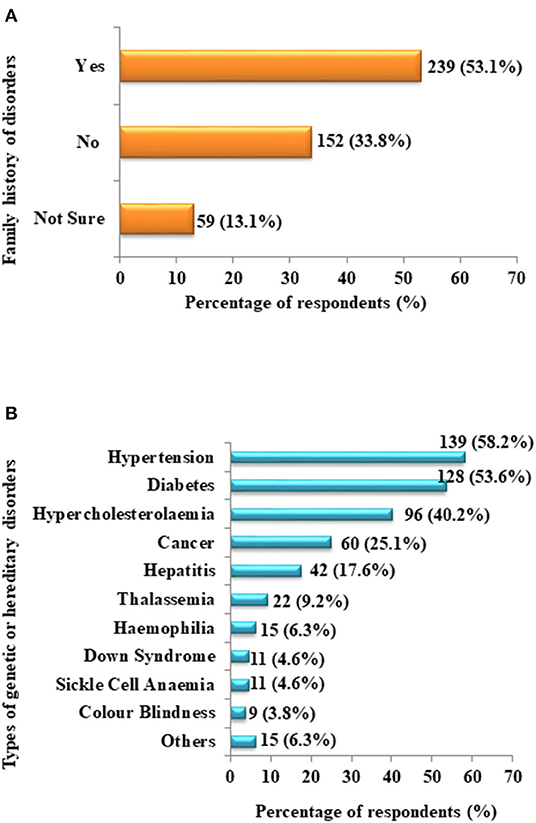
Figure 1. Distribution of respondents (in percentage). (A) Respondents with family history of any genetic or hereditary disorder. (B) The types of genetic or hereditary disorders declared by the respondents to have occurred in their family history.
In this study, 359 (79.8%) respondents have heard of genetic testing, and the Internet was their key source of information (68.0%) (Figure 2). Table 1 shows that most of the respondents (71.1%) knew that genetic testing can be used to diagnose inherited diseases. However, most of the respondents (57.2%) were unsure of the usefulness of genetic testing in reducing the prevalence of genetic diseases. They (58.3%) were also unaware that genetic testing can be used to test for various types of cancer (Table 1).
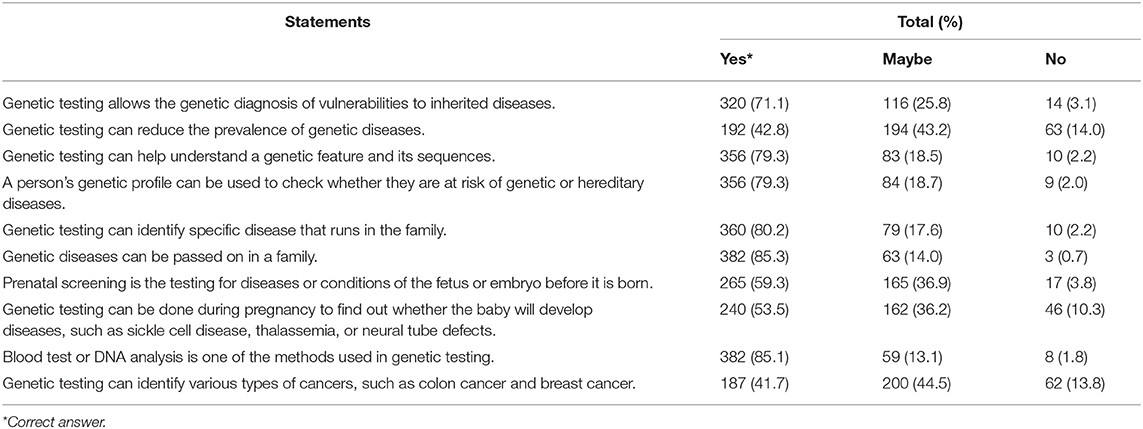
Table 1. Total and percentage of the respondents' answers pertaining to knowledge of genetic testing.
The majority of the respondents (83.1%) have adequate knowledge of genetic testing (Figure 3). As shown in Table 2, the knowledge of genetic testing can be associated with their educational level, their field of study, and whether they have heard of genetic testing or not, with each having a P-value of <0.001 (Table 2).
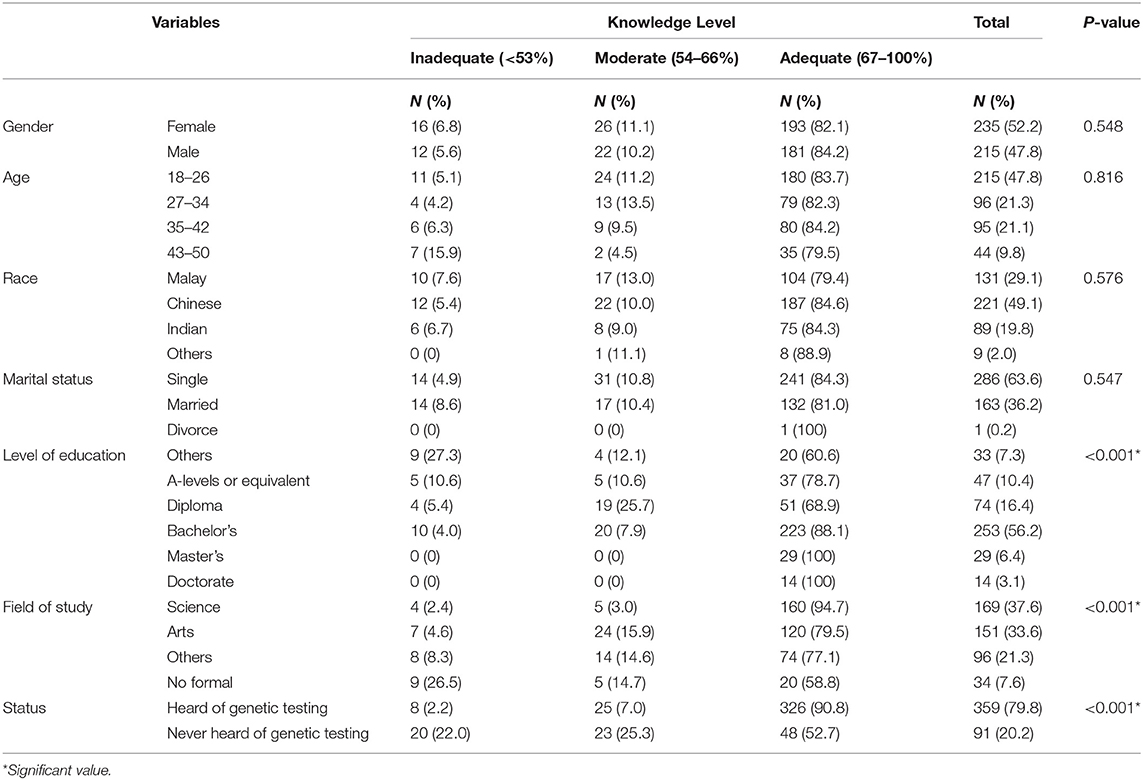
Table 2. P-value for the respective variables pertaining to questions on knowledge of genetic testing.
As shown in Table 3, half (50.2%) of the respondents showed willingness to undergo genetic testing. Questions regarding the potential providers of genetic testing were also asked, in which there is a strong support (64.6%) that genetic testing should be performed only in hospitals with a doctor's prescription and that the sale of genetic testing kits through the Internet and in stores should be banned (55.7 and 54.4%, respectively). Moreover, a significant number of respondents (78.4%) agreed that the public's view and awareness of genetic testing is essential (Table 3).
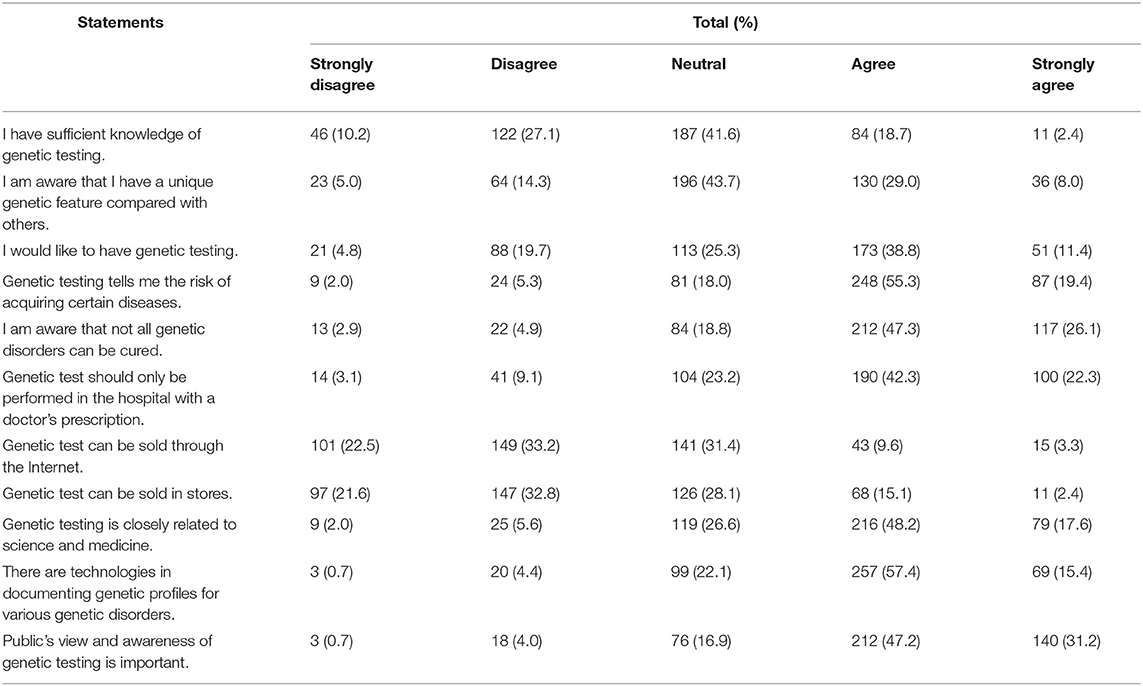
Table 3. Total and percentage of the respondents' answers pertaining to awareness of genetic testing.
Overall, the respondents showed relatively good awareness of genetic testing for hereditary disorders, which is influenced by their educational level, their field of study, and whether they have heard of genetic testing or not, with each having a P-value of <0.001 (Table 4).
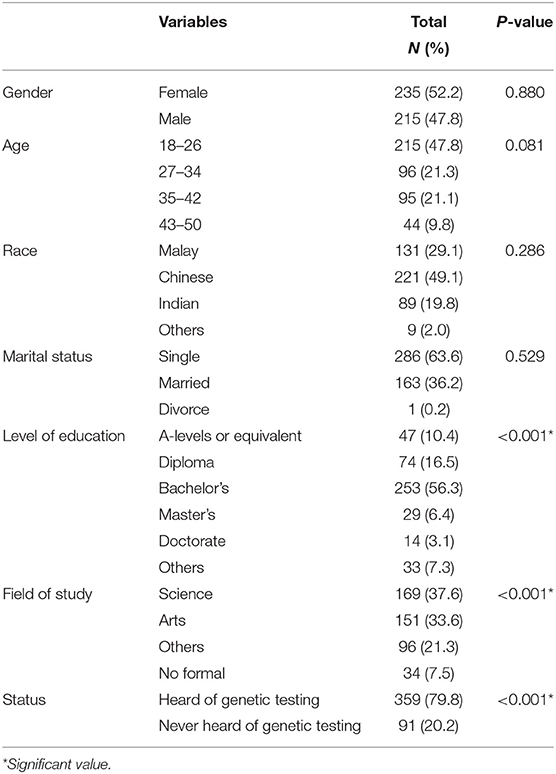
Table 4. P-value for the respective variables pertaining to questions on awareness of genetic testing.
Table 5 shows that majority of the respondents (78.7%) agreed that genetic testing is important. Majority of them agreed that genetic testing is mainly for preventive care purposes (58.7%) and that it should be offered to all newborn babies (71.0%) and pregnant women (68.8%). They also agreed that it is necessary to increase awareness of genetic testing (75.5%) and that the lack of education and knowledge leads to ethical issues concerning the practice of genetic testing (61.0%). Hence, many respondents (81.4%) agreed that laws and policies should be implemented by the government to address the ethical issues concerning the use of genetic testing (Table 5).
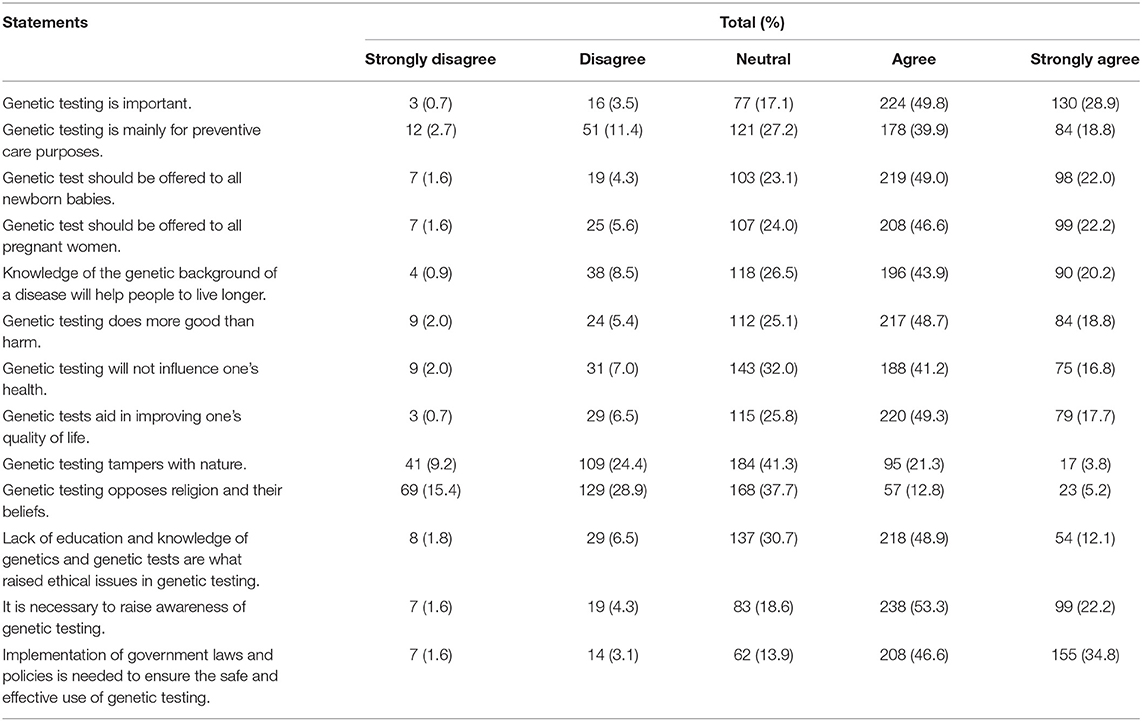
Table 5. Total and percentage of the respondents' answers pertaining to perception of genetic testing.
However, irrespective of the positive responses, many respondents remained neutral when asked whether genetic testing tampers with nature (41.3%) and opposes religion and their beliefs (37.7%). Many respondents disagreed (44.3%) with the statements compared with those who agreed (Table 5).
In general, as shown in Table 6, the respondents showed a relatively good perception of genetic testing, which can be associated with their differences in age (P = 0.016), ethnicity (P = 0.031), educational level, field of study, and whether they have heard of genetic testing or not, with each having a P-value of <0.001 (Table 6).
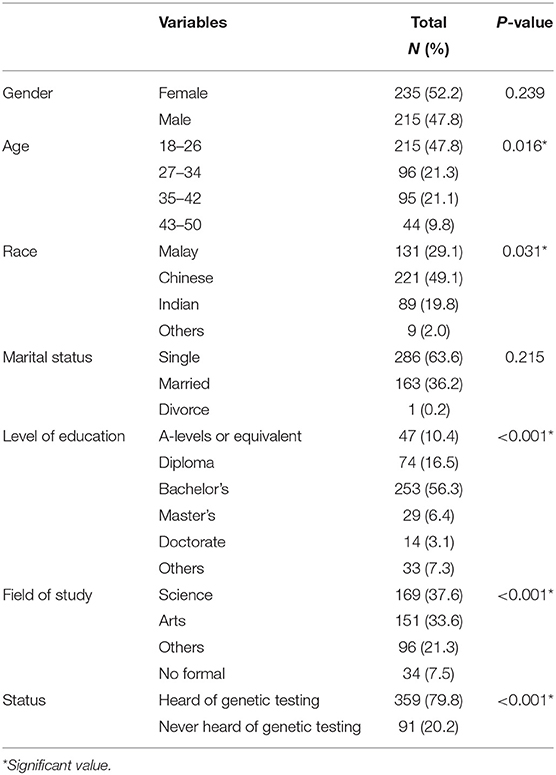
Table 6. P-value for the respective variables pertaining to questions on perception of genetic testing.
This study shows that many of the respondents have adequate knowledge of genetic testing. This finding can be attributed to the increased reporting of genetic testing in recent years in Malaysia (Yoon et al., 2011; Balasopoulou et al., 2017), which resulted in greater public familiarity of the topic of genetic testing for hereditary disorders. Similar results were observed in some countries in the Middle East, where majority of respondents in Jordan had heard of genetic testing (Mohammad Bagher et al., 2019), while most northern Iranians were interested in using genetic counseling services and genetic tests before marriage (Altaany et al., 2019).
Most of the respondents were unaware that genetic testing can be used to test for various types of cancer. In fact, cancer, particularly breast, and colorectal cancers, can be detected using hereditary cancer or predictive test (Garber and Offit, 2005; Jasperson et al., 2010).
However, good knowledge or public familiarity does not necessarily relate to true understanding, as reported in a study conducted in the United States that explored public understanding of basic genetic concepts (Lanie et al., 2004). Although the respondents can accurately describe certain scientific concepts, it may not be possible for them to translate their basic perceived knowledge of genetic testing during decision making. As reported in a previous survey, more knowledge does not automatically lead to a more positive attitude as more critical and skeptical reactions are often observed among those with highest level of knowledge (Jallinoja and Aro, 2000).
Nearly half of the respondents (50.2%) showed willingness to undergo genetic testing, whereas 24.5% of the respondents gave a negative response and 25.3% of the respondents gave a neutral response. This finding was supported by a similar study in the U.S. population where a large portion (43%) of the general public lacks awareness toward genetic testing (Krakow et al., 2017). In addition, Hann et al. (2017) and Cheng et al. (2016), reported the lack of genetic knowledge as one of the obstacles for patients to participate in gene testing (Cheng et al., 2016; Hann et al., 2017). Cheng et al. also highlighted that the relatively high cost for testing and concerns about discrimination were affecting participants' willingness in uptaking genetic testing. This was in accordance with an earlier study in North Carolina wherein most respondents were concerned about a person's ability to obtain health insurance after receiving genetic tests (Haga et al., 2013). However, these factors were not discussed in this study. We believe that clinical management of patients can be further improved with the aid of healthcare providers or genetic counselors to ascertain the patients' understanding of and beliefs about genetic testing and to increase their willingness to undergo genetic testing (Campbell et al., 2001). In this manner, patients can be better equipped to correct any misconception that they have about genetic testing, thus enabling them to make more informed decisions regarding their health.
Moreover, there is strong support from the respondents that genetic testing should be performed exclusively in hospitals with a doctor's prescription. Furthermore, the majority of the respondents were against the idea of genetic testing kits being sold in stores or through the Internet. Although no similar studies in Malaysia were found, these results were in line with those reported in a survey conducted among the Dutch and Belgium public (Vermeulen et al., 2014; Chokoshvili et al., 2017). Furthermore, in line with some previous studies, majority of the respondents agreed that the public's view and awareness of genetic testing is important (Hann et al., 2017; Krakow et al., 2017).
More than half of the respondents recognized the importance of genetic testing and its use for preventive care purposes (Table 3). They also agreed that genetic testing should be offered to all pregnant women and newborn babies. This finding can be attributed to the fact that many of the respondents have a background in science; thus, they were more aware that pregnant women and newborn babies are highly susceptible to or at risk for inherited disorders. A similar study of university students from International Islamic University Malaysia (IIUM) also reported that the majority of the respondents agreed that pregnant women with a family history of inherited disorders should be encouraged to undergo prenatal genetic screening (Sulaiman and Zainuddin, 2018). In addition, our findings are also in line with a recent study by Abdo et al., which reported the receptivity of Jordanian women to non-invasive prenatal genetic screening (Abdo et al., 2018).
Nonetheless, most of the respondents remained neutral when asked whether genetic testing tampers with nature and opposes religion and their beliefs. A minority of respondents agreed to these statements, and this can be related to their ethnicity. A significant difference between ethnicity and perception of genetic testing can be observed. As reported in a previous study in New York city, ethnic and racial identities are associated with the perception of the benefits of and barriers to the application of genetic testing (Sussner et al., 2011). In addition, a study conducted in Jordan also revealed that 12% of the respondents believed that genetic tests were forbidden (Altaany et al., 2019).
Nevertheless, with the high recognition of the importance of genetic testing, the majority of the respondents believe that it is necessary to increase the awareness of this topic as they feel that the lack of education and knowledge of genetics and tests available leads to ethical issues concerning the practice of genetic testing (Table 5). Thus, many respondents agreed that laws and policies should be implemented by the government to ensure the safe and efficient use of genetic testing. The implementation of such policies should be in line with consumers' benefits, such as their eligibility for medical and insurance coverage (Chong et al., 2018). Moreover, a recent study highlighted that the lack of knowledge of genetic testing among healthcare providers was the most significant difficulty faced in California and Malaysia (Amini et al., 2015; Qian et al., 2019). A similar trend was also observed in the Netherlands (Baars et al., 2005) and Italy (Marzuillo et al., 2013). In addition, in accordance with this study, Qian et al. reported in 2019 that expanding newborn screening can be the most beneficial tool to diagnose genetic conditions. However, the authors are agreeable with an earlier study supporting that the public must be treated as a complex body, which is not only composed of scientists, to interpret messages about genetic testing (Bates, 2005). Both scientific understanding and public understanding should be balanced to avoid facing major challenges in promoting the advantages of genetic testing.
In general, in terms of the scope of this research, only Malaysians resided in the Klang Valley were included in the survey. Therefore, the findings obtained may not be considered a direct representation of the population of Malaysia as a whole, although the residents of the Klang Valley comprised people from all states of Malaysia. Despite achieving a full response rate of 100%, inaccuracies and biases may be detected because of the choice of location and the respondents chosen. The respondents chosen are those within the age range of 18–50 years old and considered to have a higher capability to understand the topic of the study. Correspondingly, a lower response is obtained from those aged 43 years and above because of language barriers as the questionnaire was developed only in the English language. However, despite the limitations regarding the choice of respondents, this survey was conducted in a large scale, i.e., accounting for the entire Klang Valley, compared with other almost similar research that was conducted in a small scale. Furthermore, this survey provides a first update of Malaysians' knowledge, awareness, and perception of genetic testing for hereditary disorders. Thus, this study is set as the foundation for further similar studies that may be conducted in a larger scale to obtain a better assessment and a more accurate scenario of the knowledge, awareness, and perception of genetic testing of Malaysians.
The practice of genetic screening for genetic or hereditary disorders is becoming more acceptable worldwide, likewise in Malaysia. In spite of the majority of the residents of the Klang Valley having adequate knowledge and relatively good and positive awareness and perception of genetic testing, there is still a minority of respondents with negative awareness and perception. Thus, the public's knowledge, awareness, and perception of genetic testing should be improved to decrease any stigma or taboo that one may have. For this, media campaigns and government and non-government programs, such as seminars, should be arranged to further educate the public on the beneficial health consequences of genetic testing. Furthermore, the government should implement laws and policies to ensure the safe and efficient use of genetic testing.
The datasets generated for this study are available on request to the corresponding author.
This study was approved by the SEGi Ethics Committee, with project number SEGi/RIMC/FOP/26/2018. Before the survey, informed written consent was obtained from each respondent, and they were informed that the research was voluntary, confidential and purely for academic purposes.
J-JC and H-WT conceived, designed the study, and drafted the manuscript. J-JC acquired and analyzed the data. H-WT critically revised and finalized the manuscript. All authors approved the final version of the manuscript. All authors contributed to the article and approved the submitted version.
The survey study was fully funded by the faculty research fund of the Faculty of Pharmacy, SEGi University. The funder has no role in the study design, data collection and analyses, manuscript preparation, and decision to publish.
The authors declare that the research was conducted in the absence of any commercial or financial relationships that could be construed as a potential conflict of interest.
All authors thank the Faculty of Pharmacy and Research and Innovation Management Centre (RIMC), SEGi University for their continuous support during data collection, analyses, and publication.
Abdo, N., Ibraheem, N., Obeidat, N., Graboski-Bauer, A., Batieha, A., Altamimi, N., et al. (2018). Knowledge, attitudes, and practices of women toward prenatal genetic testing. Genet. Epigenet. 11:2516865718813122. doi: 10.1177/2516865718813122
Agurs-Collins, T., Ferrer, R., Ottenbacher, A., Waters, E. A., O'Connell, M. E., and Hamilton, J. G. (2015). Public awareness of direct-to-consumer genetic tests: findings from the 2013 U.S. Health Information National Trends Survey. J. Cancer Educ. 30, 799–807. doi: 10.1007/s13187-014-0784-x
Albassam, A., Alshammari, S., Ouda, G., Koshy, S., and Awad, A. (2018). Knowledge, perceptions and confidence of physicians and pharmacists towards pharmacogenetics practice in Kuwait. PLoS ONE 13:e0203033. doi: 10.1371/journal.pone.0203033
Al-Naggar, R., and Osman, M. (2013). Young women perceptions towards genetic testing of breast cancer. Biol. Med. 5, 91–97.
Altaany, Z., Khabour, O. F., and Al-Taani, G. (2019). Knowledge, beliefs, and attitudes concerning genetic testing among young Jordanians. J. Multidiscipl. Healthc. 12, 1043–1048. doi: 10.2147/JMDH.S233614
Amini, F., Kin, W. Y., and Kolandaiveloo, L. (2015). Physicians' knowledge and perception of gene profiling in malaysia. International Journal of Bioengineering and Life Sciences, 8, 871–875. doi: 10.5281/zenodo.1100883
Baars, M. J. H., Henneman, L., and Ten Kate, L. P. (2005). Deficiency of knowledge of genetics and genetic tests among general practitioners, gynecologists, and pediatricians: a global problem. Genet. Med. 7, 605–610. doi: 10.1097/01.gim.0000182895.28432.c7
Balasopoulou, A., Mooy, F.-M., Baker, D. J., Mitropoulou, C., Skoufas, E., Bulgiba, A., et al. (2017). Advancing global precision medicine: an overview of genomic testing and counseling services in Malaysia. OMICS 21, 733–740. doi: 10.1089/omi.2017.0136
Bates, B. R. (2005). Public culture and public understanding of genetics: a focus group study. Public Underst. Sci. 14, 47–65. doi: 10.1177/0963662505048409
Campbell, R., Evans, M., Tucker, M., Quilty, B., Dieppe, P., and Donovan, J. L. (2001). Why don't patients do their exercises? Understanding non-compliance with physiotherapy in patients with osteoarthritis of the knee. J. Epidemiol. Community Health 55, 132–138. doi: 10.1136/jech.55.2.132
Cheng, X., Li, Z., Sun, X., Jiang, B., and Zhuang, Z. (2016). Knowledge and willingness of breast cancer patients from Shanghai for genetic counseling and gene testing. Zhonghua Yi Xue Yi Chuan Xue Za Zhi 33, 589–593. doi: 10.3760/cma.j.issn.1003-9406.2016.05.001
Chokoshvili, D., Belmans, C., Poncelet, R., Sanders, S., Vaes, D., Vears, D., et al. (2017). Public views on genetics and genetic testing: a survey of the general public in Belgium. Genet. Test. Mol. Biomarkers 21, 195–201. doi: 10.1089/gtmb.2016.0418
Chong, H. Y., Allotey, P. A., and Chaiyakunapruk, N. (2018). Current landscape of personalized medicine adoption and implementation in Southeast Asia. BMC Med. Genomics 11:94. doi: 10.1186/s12920-018-0420-4
Colotto, M., Giraldi, L., Pastorino, R., Arzani, D., Vayena, E., Ineichen, C., et al. (2015). Student's knowledge and attitude towards direct-to-consumer genetic tests. European Journal of Public Health, 25:389. doi: 10.1093/eurpub/ckv176.042
Edwards, S. M., Kote-Jarai, Z., Meitz, J., Hamoudi, R., Hope, Q., Osin, P., et al. (2003). Two percent of men with early-onset prostate cancer harbor germline mutations in the BRCA2 gene. Am. J. Hum. Genet. 72, 1–12. doi: 10.1086/345310
Eum, H., Lee, M., Yoon, J., Cho, J., Lee, E. S., Choi, K. S., et al. (2018). Differences in attitudes toward genetic testing among the public, patients, and health-care professionals in Korea. Eur. J. Hum. Genet. 26, 1432–1440. doi: 10.1038/s41431-018-0191-6
Garber, J. E., and Offit, K. (2005). Hereditary cancer predisposition syndromes. J. Clin. Oncol. 23, 276–292. doi: 10.1200/JCO.2005.10.042
Haga, S. B., Barry, W. T., Mills, R., Ginsburg, G. S., Svetkey, L., Sullivan, J., et al. (2013). Public knowledge of and attitudes toward genetics and genetic testing. Genet. Test. Mol. Biomarkers 17, 327–335. doi: 10.1089/gtmb.2012.0350
Haga, S. B., Kim, E., Myers, R. A., and Ginsburg, G. S. (2019). Primary care physicians' knowledge, attitudes, and experience with personal genetic testing. J. Pers. Med. 9:29. doi: 10.3390/jpm9020029
Hampel, H. (2009). Genetic testing for hereditary colorectal cancer. Surg. Oncol. Clin. N. Am. 18:687. doi: 10.1016/j.soc.2009.08.001
Hann, K. E. J., Freeman, M., Fraser, L., Waller, J., Sanderson, S. C., Rahman, B., et al. (2017). Awareness, knowledge, perceptions, and attitudes towards genetic testing for cancer risk among ethnic minority groups: a systematic review. BMC Public Health 17:503. doi: 10.1186/s12889-017-4375-8
Henneman, L., Vermeulen, E., van El, C. G., Claassen, L., Timmermans, D. R. M., and Cornel, M. C. (2013). Public attitudes towards genetic testing revisited: comparing opinions between 2002 and 2010. Eur. J. Hum. Genet. 21, 793–799. doi: 10.1038/ejhg.2012.271
Hussein, Z., Taher, S. W., Gilcharan Singh, H. K., and Chee Siew Swee, W. (2015). Diabetes care in Malaysia: problems, new models, and solutions. Ann. Glob. Health 81, 851–862. doi: 10.1016/j.aogh.2015.12.016
Jallinoja, P., and Aro, A. R. (2000). Does knowledge make a difference? The association between knowledge about genes and attitudes toward gene tests. J. Health Commun. 5, 29–39. doi: 10.1080/10810730050019546
Jasperson, K. W., Tuohy, T. M., Neklason, D. W., and Burt, R. W. (2010). Hereditary and familial colon cancer. Gastroenterology 138, 2044–2058. doi: 10.1053/j.gastro.2010.01.054
Krakow, M., Ratcliff, C. L., Hesse, B. W., and Greenberg-Worisek, A. J. (2017). Assessing genetic literacy awareness and knowledge gaps in the US population: results from the Health Information National Trends Survey. PHG 20, 343–348. doi: 10.1159/000489117
Kusyk, D., Acharya, K., Garvey, K., and Ross, L. F. (2013). A pilot study to evaluate awareness of and attitudes about prenatal and neonatal genetic testing in postpartum African American women. J. Natl. Med. Assoc. 105, 85–91. doi: 10.1016/S0027-9684(15)30089-4
Lanie, A. D., Jayaratne, T. E., Sheldon, J. P., Kardia, S. L. R., Anderson, E. S., Feldbaum, M., et al. (2004). Exploring the public understanding of basic genetic concepts. J. Genet. Counsel. 13, 305–320. doi: 10.1023/B:JOGC.0000035524.66944.6d
Lee, J. M.-H., and Thong, M.-K. (2013). Genetic counseling services and development of training programs in Malaysia. J. Genet. Counsel. 22, 911–916. doi: 10.1007/s10897-013-9589-z
Lim, T. O., Morad, Z., and Hypertension Study Group (2004). Prevalence, awareness, treatment and control of hypertension in the Malaysian adult population: results from the national health and morbidity survey 1996. Singapore Med. J. 45, 20–27.
Lu, K. H., Wood, M. E., Daniels, M., Burke, C., Ford, J., Kauff, N. D., et al. (2014). American Society of Clinical Oncology expert statement: collection and use of a cancer family history for oncology providers. J. Clin. Oncol. 32, 833–840. doi: 10.1200/JCO.2013.50.9257
Marzuillo, C., De Vito, C., Boccia, S., D'Addario, M., D'Andrea, E., Santini, P., et al. (2013). Knowledge, attitudes and behavior of physicians regarding predictive genetic tests for breast and colorectal cancer. Prev. Med. 57, 477–482. doi: 10.1016/j.ypmed.2013.06.022
Mason, T., Trochez, C., Thomas, R., Babar, M., Hesso, I., and Kayyali, R. (2018). Knowledge and awareness of the general public and perception of pharmacists about antibiotic resistance. BMC Public Health 18:711. doi: 10.1186/s12889-018-5614-3
McPherson, E. (2006). Genetic diagnosis and testing in clinical practice. Clin. Med. Res. 4, 123–129. doi: 10.3121/cmr.4.2.123
Miki, Y., Swensen, J., Shattuck-Eidens, D., Futreal, P. A., Harshman, K., Tavtigian, S., et al. (1994). A strong candidate for the breast and ovarian cancer susceptibility gene BRCA1. Science 266, 66–71. doi: 10.1126/science.7545954
Mohammad Bagher, H.-S., Ali Vali, N., Golamreza, A., Alireza, T., Dariush, G., and Rita, S. (2019). Knowledge and attitude toward genetic diseases and genetic tests among pre-marriage individuals: a cross-sectional study in northern Iran. Int. J. Reprod. Biomed. (Yazd). 17, 543–550. doi: 10.18502/ijrm.v17i8.4819
Mustapa, M. A. C., Amin, L., Mahadi, Z., and Razman, M. R. (2019). Malaysian stakeholders intention to adopt genetic testing. Acad. Strat. Manag. J. 18, 1–5.
Naing, C., Yeoh, P., Wai, V., Win, N., Kuan, L., and Aung, K. (2016). Hypertension in Malaysia: an analysis of trends from the national surveys 1996 to 2011. Medicine 95:e2417. doi: 10.1097/MD.0000000000002417
Odelola, J. O., Adisa, O., and Akintaro, O. A. (2013). Attitude towards pre-marital genetic screening among students of osun state polytechnics in Nigeria. Int. J. Educ. Admin. Policy Stud. 5, 53–58. doi: 10.5897/IJEAPS2012.004
Qian, E., Thong, M.-K., Flodman, P., and Gargus, J. (2019). A comparative study of patients' perceptions of genetic and genomic medicine services in California and Malaysia. J. Community Genet. 10, 351–361. doi: 10.1007/s12687-018-0399-8
Rifin, H. M., Lourdes, T. G. R., Majid, N. L. A., Hamid, H. A. A., Hasani, W. S. R., Ling, M. Y., et al. (2018). Hypercholesterolemia prevalence, awareness, treatment and control among adults in Malaysia: the 2015 National Health and Morbidity Survey, Malaysia. Glob. J. Health Sci. 10:11. doi: 10.5539/gjhs.v10n7p11
Sim, E. U.-H., and Ting, S.-H. (2018). Patterns and determinants of attitudes towards genetic risk of cancer: case study in a Malaysian Public University. BioMed Res. Int. 2018, 1–7. doi: 10.1155/2018/4682431
Stanislaw, C., Xue, Y., and Wilcox, W. R. (2016). Genetic evaluation and testing for hereditary forms of cancer in the era of next-generation sequencing. Cancer Biol. Med. 13, 55–67. doi: 10.20892/j.issn.2095-3941.2016.0002
Sulaiman, N. S., and Zainuddin, N. (2018). Knowledge and perception regarding prenatal genetic screening of Thalassemia, Down syndrome and neural tube defects: a study among IIUM Kuantan undergraduates. Malay. J. Public Health Med. 18:9.
Sussner, K. M., Edwards, T. A., Thompson, H. S., Jandorf, L., Kwate, N. O., Forman, A., et al. (2011). Ethnic, racial and cultural identity and perceived benefits and barriers related to genetic testing for breast cancer among at-risk women of African descent in New York City. PHG 14, 356–370. doi: 10.1159/000325263
Tee, E.-S., and Yap, R. W. K. (2017). Type 2 diabetes mellitus in Malaysia: current trends and risk factors. Eur. J. Clin. Nutr. 71, 844–849. doi: 10.1038/ejcn.2017.44
Vermeulen, E., Henneman, L., van El, C. G., and Cornel, M. C. (2014). Public attitudes towards preventive genomics and personal interest in genetic testing to prevent disease: a survey study. Eur. J. Public Health 24, 768–775. doi: 10.1093/eurpub/ckt143
Wong, L. P., George, E., and Tan, J.-A. M. A. (2011). Public perceptions and attitudes toward thalassaemia: Influencing factors in a multi-racial population. BMC Public Health 11:193. doi: 10.1186/1471-2458-11-193
Keywords: knowledge, awareness, perception, public survey, genetic testing, hereditary disorders
Citation: Chin J-J and Tham H-W (2020) Knowledge, Awareness, and Perception of Genetic Testing for Hereditary Disorders Among Malaysians in Klang Valley. Front. Genet. 11:512582. doi: 10.3389/fgene.2020.512582
Received: 18 December 2019; Accepted: 30 October 2020;
Published: 03 December 2020.
Edited by:
Dov Greenbaum, Yale University, United StatesReviewed by:
Sadaf Jahan, Majmaah University, Saudi ArabiaCopyright © 2020 Chin and Tham. This is an open-access article distributed under the terms of the Creative Commons Attribution License (CC BY). The use, distribution or reproduction in other forums is permitted, provided the original author(s) and the copyright owner(s) are credited and that the original publication in this journal is cited, in accordance with accepted academic practice. No use, distribution or reproduction is permitted which does not comply with these terms.
*Correspondence: Hong-Wai Tham, dGhhbWhvbmd3YWlAb3V0bG9vay5teQ==
Disclaimer: All claims expressed in this article are solely those of the authors and do not necessarily represent those of their affiliated organizations, or those of the publisher, the editors and the reviewers. Any product that may be evaluated in this article or claim that may be made by its manufacturer is not guaranteed or endorsed by the publisher.
Research integrity at Frontiers

Learn more about the work of our research integrity team to safeguard the quality of each article we publish.